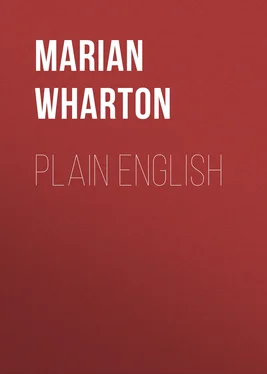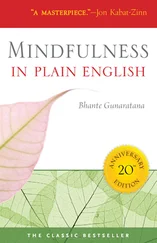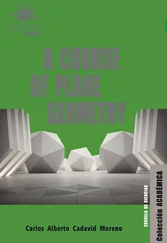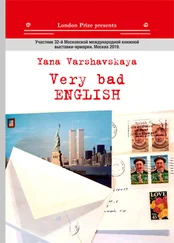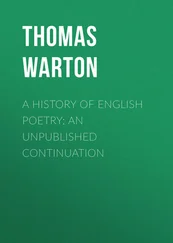Marian Wharton - Plain English
Здесь есть возможность читать онлайн «Marian Wharton - Plain English» — ознакомительный отрывок электронной книги совершенно бесплатно, а после прочтения отрывка купить полную версию. В некоторых случаях можно слушать аудио, скачать через торрент в формате fb2 и присутствует краткое содержание. Жанр: foreign_edu, foreign_language, на английском языке. Описание произведения, (предисловие) а так же отзывы посетителей доступны на портале библиотеки ЛибКат.
- Название:Plain English
- Автор:
- Жанр:
- Год:неизвестен
- ISBN:нет данных
- Рейтинг книги:5 / 5. Голосов: 1
-
Избранное:Добавить в избранное
- Отзывы:
-
Ваша оценка:
- 100
- 1
- 2
- 3
- 4
- 5
Plain English: краткое содержание, описание и аннотация
Предлагаем к чтению аннотацию, описание, краткое содержание или предисловие (зависит от того, что написал сам автор книги «Plain English»). Если вы не нашли необходимую информацию о книге — напишите в комментариях, мы постараемся отыскать её.
Plain English — читать онлайн ознакомительный отрывок
Ниже представлен текст книги, разбитый по страницам. Система сохранения места последней прочитанной страницы, позволяет с удобством читать онлайн бесплатно книгу «Plain English», без необходимости каждый раз заново искать на чём Вы остановились. Поставьте закладку, и сможете в любой момент перейти на страницу, на которой закончили чтение.
Интервал:
Закладка:
When you must divide a word at the end of a line divide it only between syllables. Never divide a word of one syllable, no matter how long it may be. If you cannot get all of it on the line, write it all on the next line. Do not divide a short word of two syllables if you can avoid it and never divide such a word when it leaves only one letter on the line or only one letter to be carried over to the next line, as for example: luck-y , a-loud , etc.
When two or more vowels are used together to make one sound they should never be separated by the hyphen, as for example, joy-ous, anx-ious, trail, dis-course, de-feat, boor-ish.
When two or more vowels placed together are not used to form one sound then these vowels may be divided, as for example, tri-al , co-or-di-nate , he-ro-ic .
Look up the words in this week's lesson in the dictionary carefully and divide into syllables. Notice specially the division of words into syllables where the word contains a diphthong and where it contains two vowels written together which are not diphthongs. Notice also the words which have a single vowel as the first or last syllable.
Monday
Museum
Creatures
Peaceable
Accruing
Already
Tuesday
Persuade
Trivial
Plague
Alert
Inquiry
Wednesday
Piteous
Patriot
Poetry
Evil
Business
Thursday
Obey
Breathe
Society
Ether
Sociable
Friday
Idealism
Pledge
Ache
Acre
Pronunciation
Saturday
Idle
Idol
Mutual
Wealthy
Neighbors
PLAIN ENGLISH
LESSON 8
Dear Comrade:
You have often read the words organic and inorganic but did you ever stop to think of the meaning of these words? We say a body is organic—a rock is inorganic; one grows from within, the other is built from without. A tree is organic; it grows. A house is inorganic; it is built. The house was never a baby house, growing from a tiny house to a large one. But the tree was once a baby tree, a sapling, and grew branch by branch to its present height. So we have two classes of things—those which grow and those which are made.
Language belongs to the class of things which grows. It is organic. We have even used the same terms in speaking about language that we use in talking of a tree. We use the words ROOT, STEM and BRANCH to describe its growth.
Language, too, has its different terms of life like a tree, its youth, its maturity, its old age, its death.
So we have dead languages like Latin and Greek—languages which are no longer living,—no longer serving mankind. But these dead languages have left living children, languages that have descended from them.
The Italian language for example is the child, the descendant of the classical Latin. We have many words in our English language from these dead languages. About five-sevenths of the words in our English are from these classical languages. The remaining two-sevenths are from the Anglo-Saxon. We use the Anglo-Saxon words more frequently, however, in our every day speech.
And it is interesting to note that our best poetry—that which stirs our blood and touches our hearts—is written in the strong forceful Anglo-Saxon words.
These words we are studying have been through some interesting experiences as they have passed from race to race down to us and the history of life is mirrored in their changes. How much more interesting they seem when we know something of their sources, just as we are more interested in a man when we know something of his boyhood and youth and the experiences through which he has passed.
You may think that the study of verbs is rather difficult and involved, but it is more simple in English than in any other language. There are fewer changes in the verb form in order to express time and person. Do not rely on the memorizing of the rules. Rules never made one a fluent speaker. Write sentences in which the correct form is used. Read aloud from the best authors until the sound of the words is familiar and they come readily to the tongue. We have used for the exercises in these lessons excerpts from the best authors.
Study these exercises carefully and note the use of the different verbs especially, this week. Verbs, like all else, are yours to command. Command them.
Yours for Education, THE PEOPLE'S COLLEGE.PROGRESSIVE VERB PHRASES
132.We have learned how to form the three principal time forms, present , past and future and the perfect or completed form of each of the three, present perfect , past perfect and future perfect . And still we have such a wonderful language that we can express other shades of meaning in time .
133.There is still another phase of action which we must have a verb phrase to express. Suppose you want to describe something you are now doing and are continuing to do, something not yet completed. To say, I do it now , is not satisfactory. Instead we say, I am doing it now .
You have by the verb phrase, am doing , described a progressive action, an action going on in the present. You may also want to describe what you were doing yesterday, an action that continued or progressed in the past. You would not say, I built the house yesterday but, I was building the house yesterday . Again you may want to describe an action which will be progressing or going on in the future. You do not say, I shall build the house next week but, I shall be building the house next week .
So we have progressive verb phrases.
134. The present progressive describes an action as continuing or progressing in the present.
It is formed by using the present time form of the verb be and the present participle.
You remember that the present participle is formed by adding ing to the simple form of the verb.
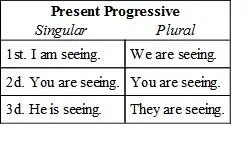
135. The past progressive time form describes an action which was continuing or progressing in the past. It is formed by using the past time form of the verb be and the present participle.
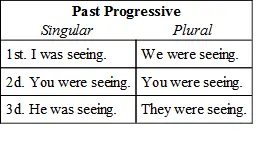
136. The future progressive describes an action which will be progressing or going on in the future. It is formed by using the future time form of the verb be and the present participle.

137.The perfect time forms also have a progressive form. There is a difference of meaning in the present perfect and its progressive form. You say for instance, I have tried all my life to be free . You mean you have tried until the present time and the inference is that now you have ceased to try. But, if you say, I have been trying all my life to be free , we understand that you have tried and are still trying.
138. So we have the present perfect progressive which describes an action which progressed in the past and continued up to the present time. It is formed by using the present perfect form of the verb be and the present participle.
Читать дальшеИнтервал:
Закладка:
Похожие книги на «Plain English»
Представляем Вашему вниманию похожие книги на «Plain English» списком для выбора. Мы отобрали схожую по названию и смыслу литературу в надежде предоставить читателям больше вариантов отыскать новые, интересные, ещё непрочитанные произведения.
Обсуждение, отзывы о книге «Plain English» и просто собственные мнения читателей. Оставьте ваши комментарии, напишите, что Вы думаете о произведении, его смысле или главных героях. Укажите что конкретно понравилось, а что нет, и почему Вы так считаете.
